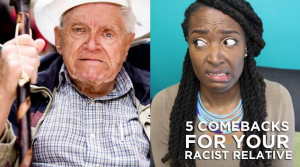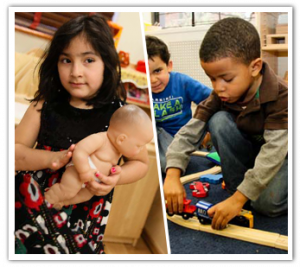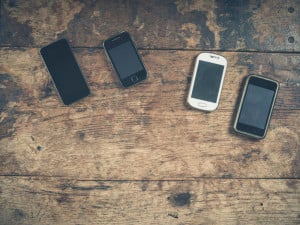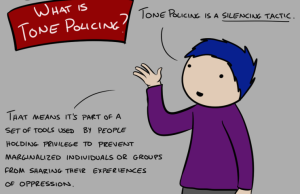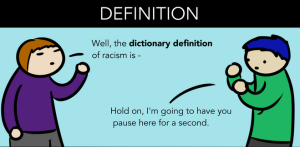Originally published on Fembot and republished here with their permission.
By now, most people recognize how harmful words such as f*ggot, c*nt, and the n-word can be.
However, a majority of the time, people say words that they don’t even know aren’t appropriate to use. Although we may not see these words as offensive or harmful, we need to recognize how hurtful they can be, and then eliminate them from our vocabulary.
And don’t worry! There are alternatives which actually communicate what you’re trying to say much better anyway.
1. Mental Illness
What we sometimes say: “I’m so OCD about this project!”
Sure, you might be super neat, but that does not mean you “are OCD.” Many people with OCD struggle immensely to control their compulsions which can lead them to articulate in self-destructive behaviors because they cannot stop.
Those with OCD often undergo various types of therapy which may or may not include medication. OCD is not a desire for things to look pretty and neat, or a recognition of meticulous attitudes.
It is an illness that can completely dominate someone’s life, whether treated or not. And when not take seriously by peers, it becomes twice as stressful.
What we actually mean, and what we should say: Meticulous, neat, picky.
What we sometimes say: “The weather is so bipolar today!”
The weather may be erratic and all over the place, but it does not suffer from manic-depressive disorder. Your friend may have changed her mind about something often and seemingly for no reason, but it does not mean she will one moment be manic one moment and the next suicidal and depressed.
Bipolar disorder is not the simple swinging back and forth between two things, or sad one moment and happy the next. Bipolar disorder involves extreme changes in moods that occur for weeks on end, that can destroy people’s lives.
What we actually mean, and what we should say: erratic, all over the place, unreasonable, back-and-forth, unstable.
What we sometimes say: “I can’t believe I got a bad grade on that test, I’m so depressed!”
Maybe this one is a little more personal for more, but it really bugs me how often people misuse the word “depressed.”
Depression isn’t necessarily just a passing sadness where you feel a little down for a couple days.
Depression is something that can feel like it takes over your life and consumes every part of you.
Depression has been so romanticized by the media and sites like Tumblr (although there can be good support resources on there), that people have a very distorted view of what depression is.
Depression is not always obvious. Life with depression feels impossible to get through at times. One might be feeling sad over something, but that does not necessarily indicate depression.
People with depression can truly be triggered by the smallest things, and jokingly throwing around the term “depressed” can make less of their struggle. Turning a serious illness into something light and annoying rather than something that can end one’s life is not okay.
What we actually mean, and what we should say: upset, sad, blue, disappointed.
What we sometimes say: “Man, he’s such a psycho!”
“Psychosis involves being disconnected from reality, which is often seen in illnesses such as schizophrenia.
Hallucinations and delusions are the symptoms of psychotic conditions, not “being a crazy asshole” like soap operas and action films like to suggest.”
People with mental illness may suffer a psychotic break which may lead them to engage in dangerous behavior, but this still does not make them a psychopath nor in any way similar to the so called “psychos” that the media loves to glamorize.
However, many people who are criminal and accused of being “psycho” do not even necessarily have a mental illness.
Often, these criminals are white and have the privilege of saying they suffer from a mental illness to get out of jail time. People of color are seen as “terrorists” or “thugs” while a white person who commits an equally terrible or worse crime is seen as “mentally ill.”
This demonstrates the institutionalized racism often present in the American justice system, and societies view on mental illness.
What we actually mean, and what we should say: Evil, strange, criminal, monstrous, murderous, dangerous.
2. Physical and Developmental Disabilities
What we sometimes say: “That’s so stupid, what are you, ret*rded?”
Being mentally disabled is not a choice. It is an intellectual disability that severely infers with one’s life, not to mention how the world views and treats anyone with a disability.
Just because someone has said or done something you don’t understand, does not mean you have the right to call it or them the r-word. Someone’s condition is not a joke.
What we actually mean, and what we should say: Confusing, foolish, silly.*
*These are very relative to the situation you use the word in. Using alternative words does not give anyone the right to insult others simply because they are not inherently offensive words.
What we sometimes say: “That is so lame!”
Being lame does not mean uncool. Being lame means you are physically impaired from using your legs, yet even within this context it is still an offensive and outdated term.
If a person who has use of their legs, they should not be using a word describing a physical inhibition to describe something they are not a fan of.
What we actually mean, and what we should say: Uncool, cheesy, tacky, corny.
What we sometimes say: “You’re too obsessed with that, what are you, autistic?”
If you’re going to insult someone, then at the very least use a word that doesn’t insult millions of people around the world, and one that actually makes sense in the context.
Having autism can have a big impact on one’s life and to use their condition to insult a person who is behaving in a way you think is strange, is simply not okay.
The “logic” for this word being used as an insult comes from various characteristics of the Autism spectrum such as preoccupation with specific interests and a high level of focus.
To turn this into something “weird” and “disturbing” shows a strong misunderstanding of the condition, not to mention just a general closed minded look at someone’s passion for their interests.
What we actually mean, and what we should say: punctilious, nerdy, geeky.
3. Sexuality
What we sometimes say: “I’m not doing that, it’s so gay!”
Say what you mean and mean what you say. If you think something is cheesy, say that, do not call it gay unless you actually mean something is homosexual in nature.
In that same sense, saying “no homo” after saying something is a lot more homophobic than you might think.
By saying “no homo” you are basically alienating yourself from homosexuality because you’re afraid of being associated with it, and it’s not cool to be a bigot.
What we actually mean, and what we should say: cheesy, corny, tacky.
***
Sometimes, we don’t know how much our words can hurt other people. And it’s necessary to educate ourselves on the meanings of words.
If someone says they are offended, it doesn’t take much to do further research and understand why. By doing this, we can truly learn how to properly and civilly communicate with one another.
[do_widget id=’text-101′]
Katherine Rendon is a second year student at the University of North Carolina Wilmington, pursuing a degree in English and Environmental Studies. When not arguing with people at parties over the importance of feminism and/or veganism, she can be found reading, watching Netflix, at a concert, or tweeting long rants. She doesn’t go anywhere without a reusable water bottle and firmly believes that selfies are important.
Search our 3000+ articles!
Read our articles about:
Our online racial justice training
Used by hundreds of universities, non-profits, and businesses.
Click to learn more
Most Read Articles
- « Previous
- 1
- …
- 30
- 31
- 32









